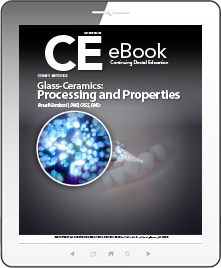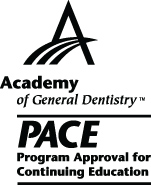CDEWorld > eBooks > Glass-Ceramics: Processing and Properties


ADA CERP is a service of the American Dental Association to assist dental professionals in identifying quality providers of continuing dental education. ADA CERP does not approve or endorse individual courses or instructors, nor does it imply acceptance of credit house by boards of dentistry. Concerns or complaints about a CE provider may be directed to the provider or to ADA CERP at www.ada.org/cerp/

Approved PACE Program Provider. FAGD/MAGD credit. Approval does not imply acceptance by a state or provincial board of dentistry, or AGD endorsement. 1/1/2023 to 12/31/2028. ID # 209722.
eBook
Released: Wednesday, May 9, 2018
Expires: Monday, May 31, 2021
Glass-Ceramics: Processing and Properties
By Russell Giordano II, DMD, CAGS, DMSc
Commercial Supporter: Dentsply Sirona - Restorative
Ceramic materials have rapidly become the material of choice for indirect restorations. This article focuses on one category, glass ceramics, with recently expanded options. Variations in composition, microstructure, and processing affect mechanical properties and use of these materials. Having a better understanding of their differences is important for proper clinical selection. This article reviews these materials based on the microstructural components of the glass-ceramics and their processing techniques.
LEARNING OBJECTIVES:
-
Explain the structure of glass-ceramics used in dentistry.
-
Describe the effects of processing on the microstructure and properties of glass-ceramics.
-
Discuss differences in mechanical properties of glass-ceramics due to microstructure and chemical composition.
About the Author
Russell Giordano II, DMD, CAGS, DMSc
Associate Professor of Materials Science and Engineering, Associate Professor of Biomaterials, Director of Biomaterials, Boston University Goldman School of Dental Medicine, Boston, Massachusetts


